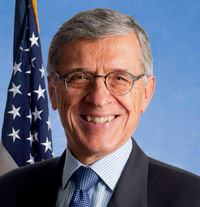The annual onstage chat at the International
Consumer Electronics Show (CES) between Consumer Electronics Association
president Gary Shapiro and the chairman of the Federal Communications
Commission -- this year the newly confirmed Tom Wheeler -- always
features a little subtle political sparring. This is muted, of course,
by Shapiro's hospitality and his pride in the mass cordiality of this
immense annual tradeshow.
But politics did leak into the 2014 discussion repeatedly, first with
Shapiro's mention of a six-month delay in Wheeler's Senate confirmation.
The suspense was engineered by conservative Republicans, notably
maverick Texas Sen. Ted Cruz, worried about possible FCC requirements
for disclosure of campaign contributions. More substantial was Shapiro's
cautious intimation that the FCC, under interim FCC chief Mignon
Clyburn, might have overstepped last year when it killed AT&T's
attempted takeover of T-Mobile, costing AT&T some $4 billion.
Emphasizing that the FCC is scrupulous about studying each deal
case-by-case, Wheeler smiled and said, "I'm kind of fascinated that
there's a kind of Lake Woebegon nature in proposed mergers. I've never
seen a merger that wasn't presented as though it was going to increase
competition." Noting that a merger by definition eliminates at least one
competitor from the market, Wheeler said that the FCC looks carefully
at such claims and says, "Really?"
Wheeler's point was that AT&T, despite intensive lobbying for
the merger, simply didn't make a strong enough case. Later, he noted
that the FCC has no vested interest in interfering in the market as
muscularly as it did in the AT&T case. He referred to the
"regulatory see-saw": If the market competes freely, protecting values
aimed at serving the consumer, he noted, the agency doesn't have to do
much.
"But," he added, "the see-saw can go the other way."
Shapiro, who was clearly feeling out the new FCC chairman, also
touched a political nerve when he asked whether the agency might
encourage a re-write by Congress of the 1996 Telecommunications Act,
considering that it predates so many changes in the electronics
landscape. Wheeler responded by noting that he was involved in the
writing of the now 17-year-old law. He admitted that, in 1996, the
Internet was still new and digital concepts were just emerging. But, he
stressed, "A set of values were well spelled out."
Wheeler said that Congress's intent was to establish guidelines
for telecommunications regulation, "and allow the FCC to stay up to
date" with new technologies. "The current act," he stated, "has ample
authority to exercise its role in this new environment.


0 comments :
Post a Comment